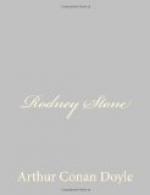flame of his life alight. She whom I had known
as the play actress of Anstey Cross became the dowager
Lady Avon; whilst Boy Jim, as dear to me now as when
we harried birds’ nests and tickled trout together,
is now Lord Avon, beloved by his tenantry, the finest
sportsman and the most popular man from the north of
the Weald to the Channel. He was married to
the second daughter of Sir James Ovington; and as
I have seen three of his grandchildren within the
week, I fancy that if any of Sir Lothian’s descendants
have their eye upon the property, they are likely
to be as disappointed as their ancestor was before
them. The old house of Cliffe Royal has been
pulled down, owing to the terrible family associations
which hung round it, and a beautiful modern building
sprang up in its place. The lodge which stood
by the Brighton Road was so dainty with its trellis-work
and its rose bushes that I was not the only visitor
who declared that I had rather be the owner of it than
of the great house amongst the trees. There
for many years in a happy and peaceful old age lived
Jack Harrison and his wife, receiving back in the
sunset of their lives the loving care which they had
themselves bestowed. Never again did Champion
Harrison throw his leg over the ropes of a twenty-four-foot
ring; but the story of the great battle between the
smith and the West Countryman is still familiar to
old ring-goers, and nothing pleased him better than
to re-fight it all, round by round, as he sat in the
sunshine under his rose-girt porch. But if he
heard the tap of his wife’s stick approaching
him, his talk would break off at once into the garden
and its prospects, for she was still haunted by the
fear that he would some day go back to the ring, and
she never missed the old man for an hour without being
convinced that he had hobbled off to wrest the belt
from the latest upstart champion. It was at his
own very earnest request that they inscribed “He
fought the good fight” upon his tombstone, and
though I cannot doubt that he had Black Bank and Crab
Wilson in his mind when he asked it, yet none who knew
him would grudge its spiritual meaning as a summing
up of his clean and manly life.
Sir Charles Tregellis continued for some years to
show his scarlet and gold at Newmarket, and his inimitable
coats in St. James’s. It was he who invented
buttons and loops at the ends of dress pantaloons,
and who broke fresh ground by his investigation of
the comparative merits of isinglass and of starch
in the preparation of shirt-fronts. There are
old fops still lurking in the corners of Arthur’s
or of White’s who can remember Tregellis’s
dictum, that a cravat should be so stiffened that
three parts of the length could be raised by one corner,
and the painful schism which followed when Lord Alvanley
and his school contended that a half was sufficient.
Then came the supremacy of Brummell, and the open breach
upon the subject of velvet collars, in which the town
followed the lead of the younger man. My uncle,




